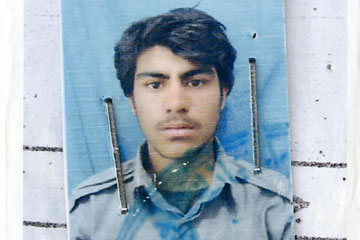
This photocopy of an image of Abdul Razaq, the killer of the three Marines, was given to the writer by a Marine in Helmand.
(6 of 12)
It is Monday, Nov. 6, 2011, the first day of id Al-Adha, the holiday celebrating Abraham's willingness to sacrifice his son Ishmael. Abdul Razaq and his fellow policemen cannot celebrate like civilians--dressing up, feasting, visiting family--but Abdul Razaq will at least cook meat in the evening. The Marines know holidays for their violence. Suicide attacks go up. The greatest danger is IEDs, and on that Id, one of them kills Sayfullah and two of his bodyguards.
Abdul Razaq is very fortunate not to be one of the two National Police officers killed with their chief. This is the kind of inescapable truth that seeps into decisionmaking like a season of rain. In the moment, though, he just follows orders as he always does. Asadullah, now the ranking officer, is concerned about what to do with his dead commander's weapons and radio. Someone trustworthy must control these scarce and valuable items. He orders Abdul Razaq to take responsibility for the equipment. Abdul Razaq does. As usual, he is a good and competent policeman. But not long after that IED kills Sayfullah, Abdul Razaq takes off his uniform and goes AWOL. And in this he is not alone: a quarter of his force is estimated to desert annually.
Abdul Razaq makes his way to Kabul, where he joins the army's 111th Capital Corps. This looks like a better job: Kabul is certainly safer than Helmand. But he does not like his new post. There are very few fellow Pashtuns in his unit, and he feels isolated. And the unit doesn't issue him a gun or send him on missions. Having been armed and going everywhere with a district police chief, he is now just another recruit, with nothing to do but control traffic.
Though Abdul Razaq may feel as if he is learning only Kabuli gridlock, he is learning some other things in the street too. Close to the end of his time in the capital, it is reported that Americans are burning copies of the Koran at Bagram Air Base. The specifics become submerged in a froth of rage and rumor. Anti-American feeling is stronger than at any point during the war. More than two dozen people die in demonstrations. As the streets churn, government officials are not unified in their response. The presidential palace urges calm, for example, but a member of parliament from Parwan says that "jihad against Americans is an obligation."
Not long after the protests, Abdul Razaq is back in Helmand, a deserter from the 111th Capital Corps.
Around that time, in late winter 2012, Asadullah is surprised by a visit from the son of his late commander. The son wants to talk about his father's men. Some have fallen on hard times. One, Hamidullah, is at home in Lashkar Gah and can't find work. Another, Abdul Razaq, was at the army academy in Kabul but was unhappy and left. Asadullah knew these two, the son reminds him, when they all served under his father, the good man who's now dead.
Asadullah knows what is coming next.
Please recruit them to your service.
Both men went AWOL after that IED, but Asadullah doesn't hold it against them. Instead, he honors the request, one elder's son to another. And when he visits Hamidullah's house in Lashkar Gah, he discovers Abdul Razaq is already there, recently returned from Kabul, eager to rejoin the National Police.
